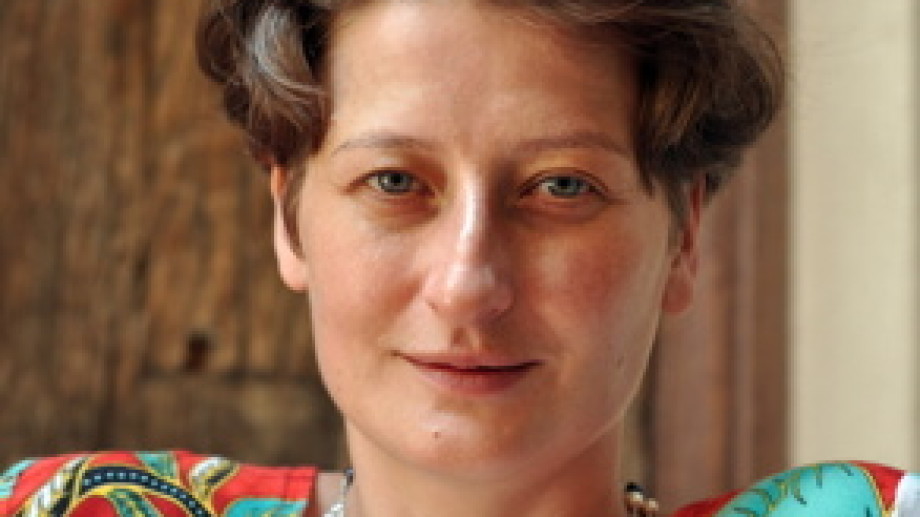
Director Zuzanna Solakiewicz
“If any nation lasts 2,000 years they will last forever and return to glory.” —Rabbi Halberstam, Yorzeit
Rabbi Halberstam’s words may reflect the entire history of the Jewish people, but they seem particularly apt in describing the headstones being excavated from various buildings in Gorlice, Poland, where the Nazis buried them during World War II. For 30 years it has been Meir Moszkowicz’s task to see to the restoration of the graves, particularly the grave of Tzaddik (righteous man). Director Zuzanna Solakiewicz (Cabaret Polska) focuses on Moszkowicz’s relationship to space, faith, Rabbi Halberstam, and the community of Gorlice in her latest work, Yorzeit. She presents a man who displays patience in trials and conveys details in his life of faith and miracles—covering a story that would normally only be covered in a small-town newspaper.
“Is this town famous because of any holy place that Hasidim (orthodox Jews) visit?” Zolakiewicz asks. “I would have to answer no. Gorlice is a completely forgotten town for Judaism. Everything you can find on the destroyed Jewish cemetery lies in graves of three holy masters.”
Traveling from his home in Israel, Moszkowicz journeys to Poland in a fight of faith-based instincts. Being of Romanian/Hungarian descent, there is more than meets the eye to Moszkowicz, whose initials read MaYM or “water.” Water surrounds, cleanses, consumes and plays an important role in the Holy Scriptures, created even before land or light. Although water plays a subtle thematic role in the film, it has a continual presence in Moszkowicz’s life, as he searches for God in a Polish town.
“Meir, being inspired by his inner faith and idealistic world, sees Gorlice as a place of miracles and his every year journey is, for him, a profound religious experience which feeds him with power to live his everyday life in Israel,” said Solakiewicz. “His joy of life helps him to eradicate painful and cruel reality.”

Meir Moszkowicz
Read our brief interview with the director:
When did you decide to make this documentary? And why tell this story?
This is an interesting question. Why, when you’re a Polish, not-Jewish female, do you decide to make a film about an orthodox Jewish male. How I met Meir is a long story, too long to be said in few words. I can only tell you that in the end, or rather in the beginning of our journey, Meir decided that probably the only answer is that I was sent from heaven. Otherwise there is no logical explanation how two people like us could have done something like this together. Meir thought I was sent from heaven to help him with translating into Polish during his visits in Poland. It took me five years to convince Meir that I was sent from heaven to make a film.
I decided to make a film about him the moment we met in Gorlice in 2005, but it took me few years of work until I reached the moment when Meir trusted the camera and trusted me.
I wanted to tell this story because I think the need for spiritual travel disappears in our times and that is not good. I mainly wanted to show the positive aspect of this religious experience, which we forget when we’re criticizing religion. Meir embodies the universal search for the transcendental truth. At the same time he expresses it using the means, symbols and meanings of his Hasidic culture. In the historical context of Jewish history in Poland, the Polish-Jewish relationship, and the Holocaust, which took place on this soil, comes Meir’s ability to find the holiness here, which is something exceptional and worth telling.
Why did Meir see such significance in the headstones? Is this part of Jewish tradition?
Headstones are not only tombstones from the cemetery, but because of the way they were destroyed they are turned into a symbol of the Holocaust. And what makes Meir an extraordinary hero is that his attitude toward this excavation is beyond the historic, national or patriotic boundaries. Meir's faith allows him to remain untouched; he is still a “simple Hasid” who does what he has to do in dealing with the renovation of the cemetery. He gets his energy and joy of life in the Holy presence of God, and his master, while praying on the master’s grave. He is an orthodox Jew traveling to today's Poland to talk to God. And what he does with the tombstones is in the framework of religious Jewish tradition.
When Meir talks about water, there's a passion and sentiment in his voice, what greater meaning do you believe this has for his journey?
In Hebrew the initials of his name mean “water” MaYM. The miracle when he was saved from death happened over the ocean (water). The flood happened in Gorlice a few years ago when the mayor of the city did not want to take care of the grave of the Zaddik. So yes, everything revolves around water in Meir’s story. I believe that presence of “water” that he finds in everything significant that happens to him lets him make his experience coherent; it helps him to find deeper meaning. Water is symbolic and makes sense to all these miracle stories.
Yorzeit is screening as part of the New York Jewish Film Festival on January 16 at 3:30pm and January 17 at 6:30pm. Director Zuzanna Solakiewicz will be in person at both screenings!



